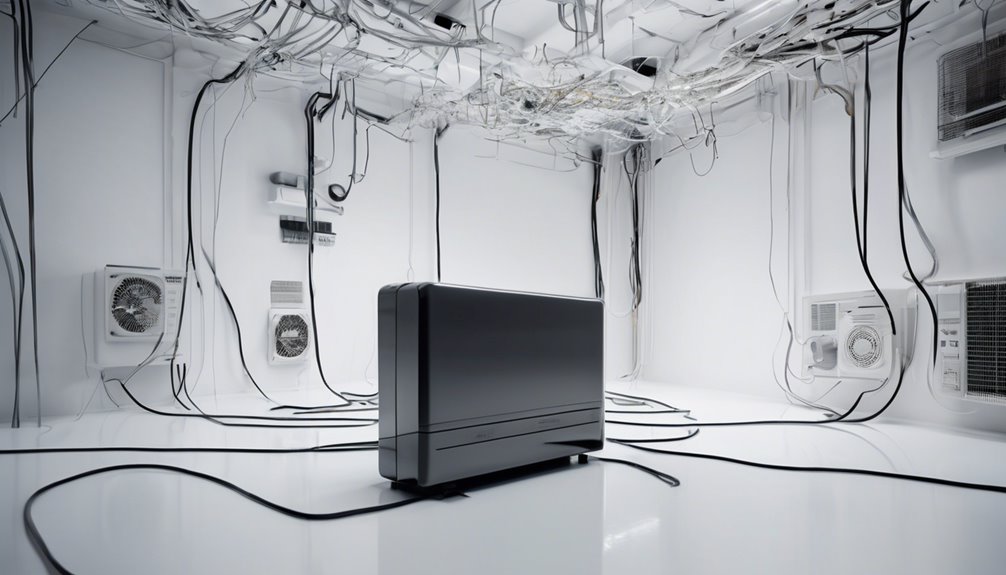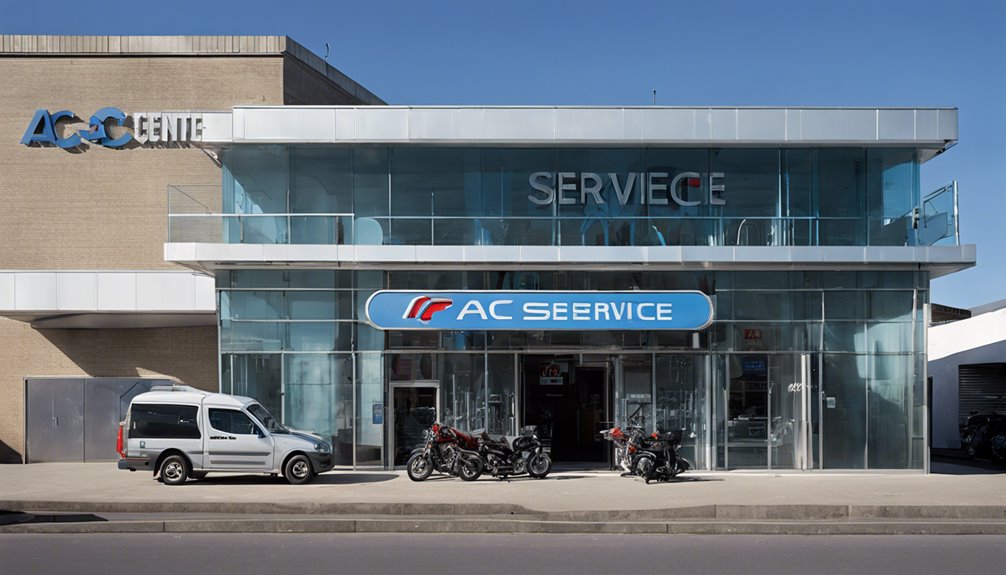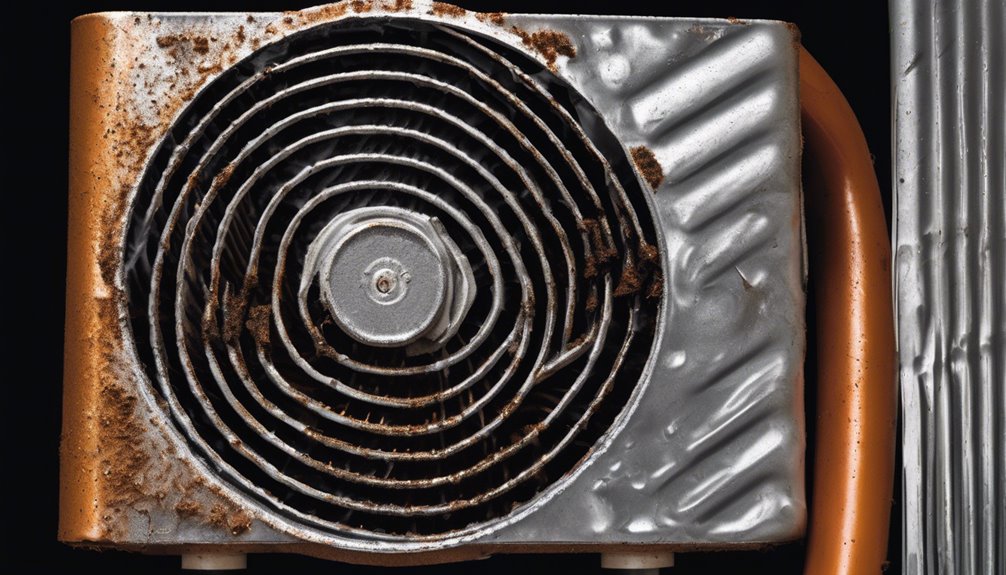When your AC is making a humming noise but not working, it's usually a sign that something's amiss. You might have loose belts, worn bearings, or refrigerant leaks causing the issue. It could also be a faulty thermostat, capacitor problems, or restricted airflow. Whatever the cause, ignoring it can lead to further damage. Take a closer look at these common culprits to get your AC up and running quietly again – and you might just uncover the solution you need to beat the heat.
Key Takeaways
- A humming AC that's not working may indicate a refrigerant leak, which requires a professional inspection to diagnose and repair.
- Loose belts, worn bearings, or faulty capacitors can cause a humming noise and prevent the AC from functioning properly.
- Thermostat issues, such as sensor calibration problems or wiring faults, can also cause a humming noise and disrupt AC operation.
- Restricted airflow due to dirty coils, vent blockages, or clogged air filters can lead to a humming noise and AC malfunction.
- Identifying and addressing the underlying cause of the humming noise is crucial to restore the AC's proper function and quiet operation.
Common Causes of a Humming AC
Many air conditioning units emit a humming noise, but what's behind this peculiar sound?
You're probably wondering what's causing your AC to hum instead of blowing cool air. Well, it's not uncommon, and there are a few common culprits behind this issue.
One likely cause is loose belts. Over time, these belts can wear out and slip, resulting in a humming noise.
Another possibility is worn bearings. When bearings wear down, they can cause the motor to vibrate, producing a humming sound.
If you suspect either of these issues, it's essential to address them promptly to avoid further damage to your AC unit. By identifying and fixing the root cause, you can get your AC running smoothly and quietly again.
Refrigerant Leaks and Low Refrigerant Levels
A refrigerant leak or low refrigerant levels in your AC unit can also cause that annoying humming noise.
You mightn't even notice the leak, but it's causing your AC to work harder, leading to that humming sound.
To diagnose the issue, you'll need a refrigerant inspection.
Diagnosing a refrigerant leak or low levels requires a professional inspection to identify the root cause of the issue.
A professional technician will perform pressure testing to identify any leaks or low levels.
If they find a leak, they'll repair or replace the faulty component.
If the levels are low, they'll recharge your AC with the correct type and amount of refrigerant.
Don't try to fix this issue yourself, as refrigerant handling requires specialized training and equipment.
Thermostat Issues and Malfunctions
Since your AC's thermostat is responsible for regulating temperature, it's no surprise that issues with it can also cause that humming noise.
A faulty thermostat can prevent your AC from working properly, resulting in strange sounds. One common issue is sensor calibration problems, which can cause the thermostat to misread the temperature, leading to incorrect cooling cycles.
This can cause the humming noise you're experiencing. Another possible problem is wiring faults, which can disrupt the thermostat's ability to communicate with the AC's compressor and fan.
If the wiring is damaged or corroded, it can prevent the AC from working correctly, resulting in that annoying humming sound. Check your thermostat's sensor and wiring to see if they're the culprits behind the noise.
Capacitor Problems and Electrical Issues
Your AC's capacitor plays a crucial role in storing energy for the compressor and fan motor, so when it malfunctions, you may hear a humming noise.
A faulty capacitor can prevent your AC from working properly, causing the humming sound. It's essential to check the capacitor for signs of wear or damage.
A faulty capacitor can prevent your AC from working properly, causing a humming sound, making inspection for wear and damage essential.
You should also inspect the wiring for any signs of faulty connections or electrical surges that may have damaged the capacitor. Electrical surges can cause the capacitor to malfunction, resulting in a humming noise.
If you suspect a capacitor problem, it's recommended to contact a professional to diagnose and replace the faulty component.
Airflow Restrictions and Blockages
Restricted airflow can cause your AC to hum, vibrate, or make other unusual noises, so it's essential to inspect the system for any blockages or restrictions. You'll want to check for dirty coils, as they can reduce airflow and cause your AC to malfunction. Additionally, vent blockages can also restrict airflow, leading to unusual noises.
| Common Airflow Restrictions | Solution |
|---|---|
| Dirty Coils | Clean the coils with a garden hose or replace them if necessary |
| Vent Blockages | Clear any debris or obstructions from the vents |
| Clogged Air Filters | Replace the air filters with new ones |
| Closed or Blocked Vents | Open or clear any closed or blocked vents |
| Leaky Ducts | Seal any leaks in the ducts to improve airflow |
Frequently Asked Questions
Can I Fix a Humming AC Myself Without a Professional?
You can try DIY troubleshooting to identify the issue, but it's recommended to inspect AC components carefully before attempting a fix, as a faulty diagnosis can worsen the problem, and it's often safer to call a pro.
Will a Humming AC Increase My Electricity Bill?
When your AC is humming, you're probably wondering if it's increasing your electricity bill. Yes, it will, as it still consumes energy even if it's not cooling. This unnecessary energy consumption will definitely have a bill impact, so it's essential to address the issue ASAP.
Can a Humming AC Be a Fire Hazard?
You're right to worry about electric risks; a humming sound can signal faulty wiring, which increases the risk of a fire. If you notice sparks or burning smells, turn it off and call a pro to inspect and fix the issue before it's too late.
Can I Use a Dehumidifier to Supplement a Humming AC?
You can use a dehumidifier to supplement your AC, improving humid air circulation and energy efficiency. By removing excess moisture, it'll help your AC work more efficiently, but it won't fix the underlying humming issue.
Will a Humming AC Damage Other Appliances in My Home?
You're right to worry if a malfunctioning appliance might harm others. A humming AC can cause power surges, potentially damaging other devices. However, with power surge protection and proper electrical shielding, you can minimize the risk of damage to your other appliances.
Conclusion
You've tried to troubleshoot your AC, but it's still humming away without cooling your space. Don't sweat it! By now, you've identified the possible culprits behind the humming noise. Refrigerant leaks, thermostat malfunctions, capacitor problems, and airflow restrictions are all common causes. Take action to address the issue, and you'll be back to enjoying cool air in no time. Remember to check for refrigerant leaks, replace faulty capacitors, and ensure proper airflow to get your AC up and running smoothly again.


